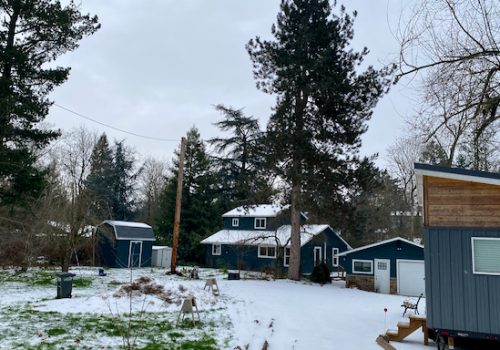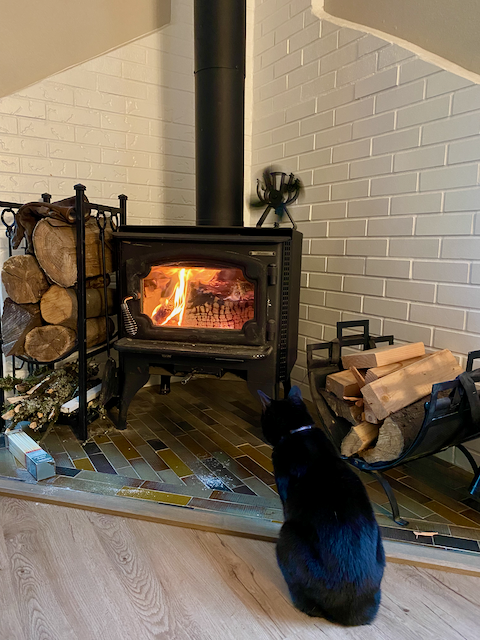In the Heart of Winter
February 21, 2024
by Fumi
Each Sunday evening, we invite friends and neighbors to our home for our weekly Sunday Soup and Contemplation. It’s a simple, modest gathering: at most ten, and often just two or three friends will gather for contemplative practice followed by a soup supper. The evening starts with introductions and a grounding poem or song at 4:30 p.m., followed by twenty minutes of silence during which people are invited to engage in whatever form of contemplation or prayer practice they choose. Then, we move into “heart-sharing,” in which participants are invited to share directly from their heart for two or three minutes, as the rest of us hold what is shared in our own hearts. At 5:30 p.m., we share a big pot of soup.
Winter is the contemplative season. The days are shorter, trees and other plants go dormant, and the world seems to slow down. We are naturally less active, giving us a chance to turn our attention from the outer landscape to our inner heartscape. Perhaps we sleep more, and let the world of dreams speak to us. We sit. We read. We pray.
Turn toward the holocaust, it approaches /on every side, there is no other place /to turn. Dawning in your veins /is the light of the blast/ that will print your shadow on stone/ in a last antic of despair /to survive you in the dark. /Man has put his history to sleep/ in the engine of doom. It flies /over his dreams in the night,/ a blazing cocoon. O gaze into the fire /and be consumed with man’s despair, /and be still, and wait. And then see /the world go on with the patient work /of seasons, embroidering birdsong /upon itself as for a wedding, and feel your heart set out in the morning /like a young traveler, arguing the world/ from the kiss of a pretty girl./ It’s the time’s discipline to think/ of the death of all living, and yet live.
~A Discipline, by Wendell Berry
The Jesuit priest and theologian Walter Burghart once described contemplation as a long, loving look at the real. The trouble is, “the real” so often appears bleak and hopeless. Who wants to contemplate war, suffering, or climate change? It seems easier to turn away, to distract ourselves with work, family, Netflix or Instagram.
We, too, would like to look away, and the truth is, we often do. Yet our intuition tells us that if there is a path forward it is one we will find only by squarely facing the challenges of our times – that is, only through contemplation.

The farmer, prophet, and poet Wendell Berry captures this dynamic in his poem, A Discipline, which we recently shared at our Sunday gathering. Turn toward the holocaust, and to the nuclear explosions that will print your shadow on stone. Gaze into the fire. Be consumed with despair. Don’t turn away from the horror of our times; turn toward it; gaze into it.
Then, the contemplative practice: be still, and wait. And then see… Perhaps there is more to “the real” than the wars and the suffering. Perhaps there is the patient work of the seasons, embroidering birdsong upon itself as for a wedding. Perhaps, when we take a long, loving look at the real, something else emerges from the wreckage of our despair – something we might call the really real, something like life itself.

I think of Wendell Berry as my uncle Wendell – old, wise, and a bit old-fashioned, especially when it comes to his gendered thinking and language. I yearn to cling to his wisdom, to his old-fashioned hope. Yet, even as I write these words, a part of me wants to rebel: you wrote these verses in 1968, and since then, even the patient work of seasons has fallen apart!
And yet.
If uncle Wendell’s insight is that life is, and life must, and life will, despite the destruction, isn’t there wisdom in that? We do live, and that’s something. What a discipline, what a calling not of our choosing to be born in this time, when we must think of the death of all living, and yet live.
At Dandelion House, we practice this discipline of turning toward the holocaust and gazing into despair, of taking a long, loving look at the real, every Sunday at 4:30 p.m., and, within our own community, every morning at 7:30 a.m. Then we get on with the business of living – the daily tasks of cooking food, planting a garden, or offering hospitality.
We’ve learned a few things along the way: that amidst a crumbling world, there is still joy in community; that individuals – humans, animals, trees, creeks – matter; that we can, if not stop the destruction around us, then lessen its impact by sharing the burden.
We invite you to join us one of these Sundays, to begin your week with contemplative community, especially now, in these dark days of winter, and of human history.
